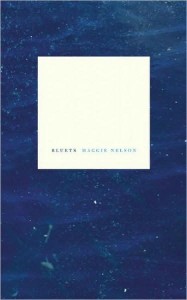6 Books: Maggie Nelson on Nonfiction
 This is Part III in a series where I ask writers I like for 6 book recommendations according to some loose guideline. Part I is here; Part II is here. This week is another installment on nonfiction, this time brought to us by Maggie Nelson, author of Bluets (Wave Books), the forthcoming The Art of Cruelty: A Reckoning (Norton), and five other books of poetry, criticism, and essay.
This is Part III in a series where I ask writers I like for 6 book recommendations according to some loose guideline. Part I is here; Part II is here. This week is another installment on nonfiction, this time brought to us by Maggie Nelson, author of Bluets (Wave Books), the forthcoming The Art of Cruelty: A Reckoning (Norton), and five other books of poetry, criticism, and essay.1. My Parents, Herve Guilbert, trans. Liz Heron
The back of my book calls this a blend of fiction and autobiography; I read it simply as a great example of what some non-Americans would call “life writing.” Guibert—a French writer and photographer who died of AIDS at 36—here gives an astonishingly weird account of how his parents “divided up the ownership of [his] body.” “Something about this story is not right,” he says about his aunt’s faulty account of his circumcision—and indeed, Guibert’s book is blessedly not right in the most compelling of ways.
2. The Importance of Being Iceland: Travel Essays in Art, Eileen Myles
A tour de force of major and minor nonfiction jewels by Myles, one of the world’s most important living writers. Not only a rocking example of what art criticism, or “vernacular scholarship,” could be, but also a radical, casual act of canon/world re-creation, one which includes Nicole Eisenman, Sadie Benning, Peggy Ahwesh, Daniel Day Lewis, Ann Lauterbach, William Pope.L, and Bjork, among others.
3. A Place to Live, and Other Selected Essays of Natalia Ginzburg, trans. Lynne Sharon Schwartz.
I’m utterly entranced by Ginzburg’s style—her mysterious directness, her salutary ability to lay-things-bare that never feels contrived or cold, only necessary, honest, and clear. Her 1944 essay “Winter in the Abruzzi,” a 6-page account of the months she and her family spent in exile, directly before the torture and murder of her husband by Fascist forces in Italy, is a punch-you-in-the-stomach-with-grief-and-beauty masterpiece.
4. Ventrakl, Christian Hawkey
Is Ventrakl nonfiction? “Documentary Poetics”? Who cares—and I would hesitate to cast about for magic-stealing phrases which might detract from Hawkey’s rich investigation of the life and work of German poet Georg Trakl. Hawkey approaches his subjectfrom every angle under the sun, ever-deepening the stakes of identification and translation, ever-reveling in the glory of strange & beautiful language.
